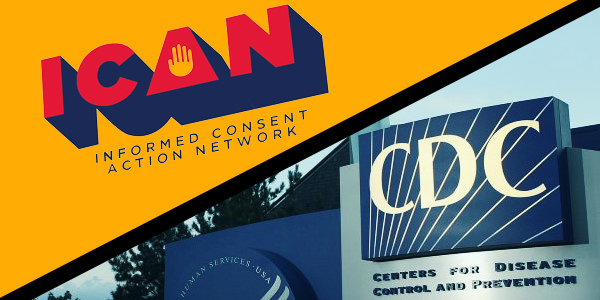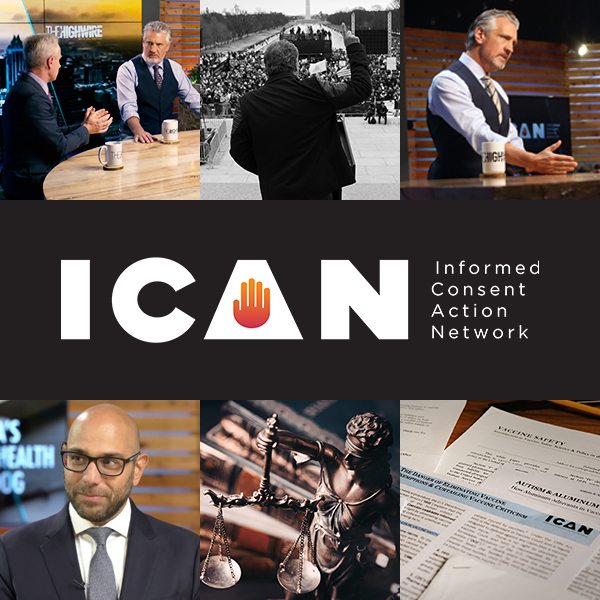Share this:

CDC FINALLY CAPITULATES AND PRODUCES EMAILS BETWEEN THE DIRECTOR OF ITS SAFETY OFFICE, FRANK DESTEFANO, AND THREE MAJOR VACCINE MAKERS
Back in 2018, ICAN, through its attorneys, submitted a FOIA request for all communications exchanged between Dr. Frank DeStefano, Director of the CDC’s Immunization Safety Office, and the pharmaceutical companies, GSK, Sanofi, and Merck, which make and sell most childhood vaccines. The CDC located responsive documents, but withheld a substantial amount in its production claiming a “deliberative process” privilege. In other words, the CDC was claiming that the communications between these for-profit pharmaceutical companies and the director of CDC’s immunization safety office were not going to be released because they involved discussions setting CDC policies or decisions! More than 2 years later, and only after a lawsuit was filed, the CDC withdrew its objection when ICAN forced it to defend this preposterous position in open court.
In 1986, when all vaccine manufacturers were granted immunity from liability (the only product in America to be granted such a pass), Congress made HHS and its agencies responsible for vaccine safety. The CDC’s Immunization Safety Office is supposed to play a central role in ensuring the safety of these liability-free products. As you know, the CDC vigorously promotes the administration of the approximately 74 doses of vaccines on its childhood vaccine schedule, most of which are made and sold by GSK, Sanofi, and Merck. What we do not know is whether the CDC takes its role as a watchdog over the pharmaceutical companies seriously, especially when those companies earn billions of dollars selling these vaccines. In order to find out whether the Director of the Immunization Safety Office, Dr. Frank DeStefano, has been fulfilling his responsibilities as a watchdog, ICAN submitted a FOIA request to the CDC.
The request sought all of DeStefano’s communications with GSK, Sanofi, and Merck while he was the Director of the Immunization Safety Office. The CDC located 281 pages of responsive records, of which 81 pages were completely withheld and 30 pages were redacted. The CDC explained it was withholding the 81 pages because:
After a careful review of these pages, some information was withheld from release pursuant to 5 U.S.C. §552 Exemption[] 5…Exemption 5 protects inter-agency or intra-agency memorandums … Information withheld under this exemption was protected under the deliberative process privilege. The deliberative process privilege protects the decision-making process of government agencies. The deliberative process privilege protects materials that are both predecisional and deliberative.
The CDC withheld communications between DeStefano at the CDC and private for-profit vaccine manufactures, who DeStefano is tasked with policing because it claimed these documents need to be kept from the public to protect “the decision-making process of government agencies.” The CDC, in essence, claimed that DeStefano and GSK, Sanofi, and/or Merck were acting together to create “formal or informal agency policies or decisions.” This admission was incredible. Dr. DeStefano and the CDC are supposed to act as watchdogs over these companies, not engage in secret conversations with these companies to formulate CDC policies and decisions!
ICAN did not accept the CDC’s justification for withholding these documents and it filed an internal appeal within the agency. The CDC never substantively responded to that appeal. ICAN was therefore forced to file a lawsuit on February 19, 2020. ICAN’s attorneys, argued that the redacted and withheld emails plainly do not qualify for protection under Exemption 5 and that, if indeed the Safety Office is formulating and creating official government policy hand in glove with the very for-profit pharmaceutical companies it is supposed to be a watchdog over, this conduct heightens ICAN’s concern undoubtedly making these documents of great importance to the public. ICAN also demanded a detailed listing of every withheld document and information concerning same. Only when the CDC had to file its formal motion defending its position for withholding these documents did it finally capitulate.
One of the documents originally withheld was a draft version of a “Manual for Active Vaccine Safety Surveillance.” This draft was created and reviewed by DeStefano as well as individuals at GSK, Sanofi, Merck, and other organizations. The draft contains some very concerning admissions, including:
- “The introduction of additional safety surveillance (including active safety surveillance) could potentially lead to negative impact on the public’s confidence in the vaccines and the willingness to participate in vaccination programs.”
- Discussing Adverse Events Following Immunization (“AEFI”), the report states: “Although extensive efforts were initiated to actively find cases of AEFI in multiple settings, underreporting remained a major limitation (e.g., more than 38,000 deaths within one month of vaccination would be expected in the eight countries; however, only 33 deaths were reported.”
The entire production is available here.
Perhaps more interesting, however, is the fact that the CDC did not produce any documents showing its oversight, policing, or role in ensuring safety of GSK’s, Sanofi’s, or Merck’s vaccines. ICAN will continue to invest its time and resources to ask questions, receive documents, and create the transparency that our public health agencies seem to refuse to provide on their own.
